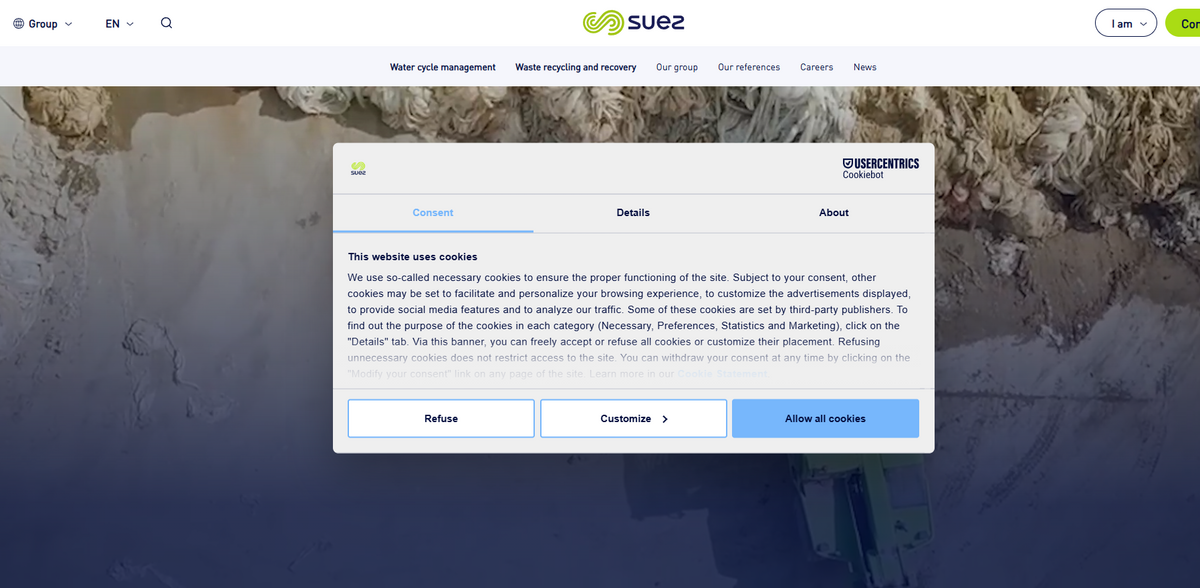What the Project Is
Transform Water Management to Create a More Sustainable Future – that is the mission of the SUEZ project. Faced with growing environmental challenges, the project develops efficient, circular, and innovative solutions that ensure water resources are managed responsibly. With an approach covering the entire water value chain, the project offers integrated expertise to guarantee a reliable, clean, and high-quality water supply. For more than 160 years, SUEZ has been actively improving the positive impact of water operations, always keeping in mind that protecting water is more crucial than ever in our world of growing populations and increasingly scarce resources.
Main Benefit
Key figures and facts of the project underline its impressive scope:
- Each day, domestic wastewater from around 36 million people is treated worldwide.
- There are currently 50 wastewater reuse projects under review in France.
- With over 50 years of experience, more than 260 seawater desalination plants have been built around the world.
- Digital leak detection solutions save the equivalent of 8,878 Olympic-size swimming pools of water every year.
- A biomethane project in Pau-Lescar is converting wastewater into green, low-carbon energy, providing sustainable power in the Pau Béarn Pyrénées area.
- The project generates 7.7 terawatt hours of energy annually, supplying electricity to more than 1.5 million Europeans.
- An “energy positive” treatment plant under construction in Nice is set to generate four times more energy than it currently uses.
Water Management Priorities
The project focuses on tackling the challenges that relate to the environment through five key priorities in water management. There is a strong emphasis on modern water treatment facilities, investing in seawater desalination, improving water infrastructure, promoting low-carbon use of water in industry, and increasing energy production through water-related processes. Daily operations include treating domestic wastewater, exploring reuse projects, and integrating alternative solutions such as reusing treated wastewater, seawater desalination, and even extracting energy from water processes. These priorities ensure that essential water services – like producing drinking water and wastewater treatment – are provided wherever needed, ensuring access to high-quality water and sustainable practices.
Innovation in Water and Energy
Innovation is at the heart of this transformative project. Through cutting-edge research and development initiatives, the project supports sector transformation by doubling the investment in innovation areas. With the know-how of 1,100 experts, 1,700 patents, and 10 dedicated research centres, extensive efforts are underway in areas such as finding alternative water resources, removing emerging contaminants, and optimizing sludge treatment. The engineering and construction expertise involved has led to designs for new infrastructures and treatment plants that emit lower greenhouse gases and generate more local resources – a dynamic approach that propels the energy transition forward.
Sustainable and Responsible Services
Access to drinking water is treated as a crucial service, given its importance for human health and community well-being. In France, drinking water stands as one of the most tightly controlled products for human consumption, evidenced by over 27 million analyses in 2023. Expertise spans the range from designing new drinking water production plants to ensuring their smooth operation and maintenance. Infrastructures are carefully tailored to the quality of available raw water and the stringent requirements of drinking water. These efforts extend beyond drinking water production; alternative water sources, such as treated wastewater, rainwater, and seawater, are also considered for non-drinking applications—a necessary shift when traditional freshwater resources like groundwater and surface water are depleting. It is all about managing water wisely and sparingly.
Project Impact on the SDGs
- SDG 6: Clean Water and Sanitation
- SDG 7: Affordable and Clean Energy
- SDG 9: Industry, Innovation, and Infrastructure
- SDG 11: Sustainable Cities and Communities
- SDG 13: Climate Action
Looking to the Future
By 2030, the project is set on targeting 100% sustainable solutions that have a positive impact on the environment, health, and climate. With a legacy beginning at the end of the 19th century and a robust operational presence on five continents, SUEZ has consistently strived to preserve the natural capital of water, soil, and air. This vision is supported by a workforce of 90,000 employees and an impressive track record in water management, waste recovery, site remediation, and air treatment. The method is not only about treating water – it is about reimagining resource management by optimising processes through “smart” cities and by ensuring that essential services continue even in times of drought. There is a real sense of progression… a commitment to future generations that builds on decades of expertise and innovative practice, constantly driving improvements in ecological transition and economic performance.


















